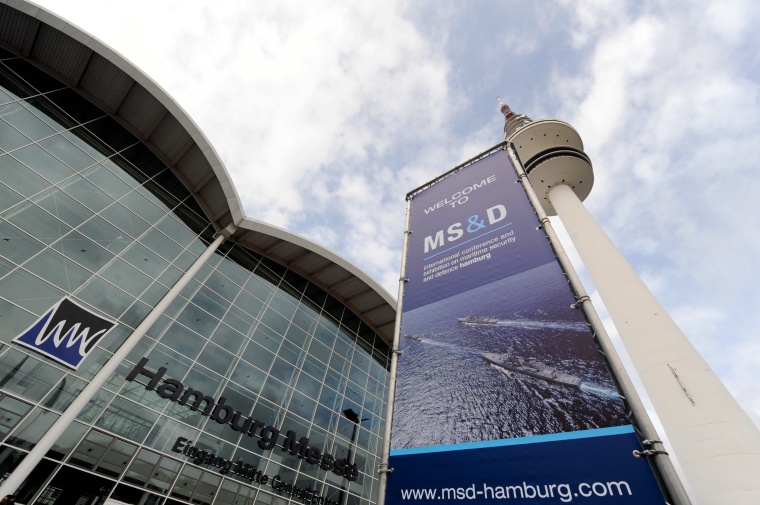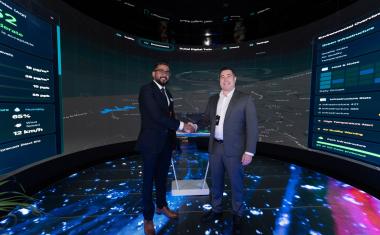MS&D 2011: Focus on security of ports and international shipping
"The main focus of work for the navies has changed in the past years, and that is also reflected in the conference themes of MSD 2011," explains Ulrich Otto, Rear-Admiral (ret.) an...

"The main focus of work for the navies has changed in the past years, and that is also reflected in the conference themes of MS&D 2011," explains Ulrich Otto, Rear-Admiral (ret.) and until January 2008 Director of the Naval Bureau of the German Navy. He is Chairman of the Defence Panel at the MS&D international conference, which is to be held from 15 to 17 June 2011 at the Hamburg Fair site, concurrently with the MS&D exhibition.
The everyday activities of navies today include protection of the shipping routes, intelligence gathering and defence against terrorist activities and piracy, and thus control of the seas even at such distance from home waters. Asymmetrical conflict situations have now moved more into the foreground, compared with conflicts between organised fleets.
This shift in activities is also the subject of a number of presentations in the introductory Plenary Session of the conference. Thus Rear-Admiral Axel Schimpf, Inspector of the German Navy since April this year, will speak on current developments and perspectives of maritime security. As is evident from the conference programme, it is no longer possible to draw a precise dividing line between Defence and Security, in view of current threats to international shipping and global trade.
Naval tasks in transition
That is also the view taken by Lutz Feldt, Rear-Admiral (ret.), who was Inspector of the German Navy until 2006 and is now President of the DMI (German Naval Institute). He is Chairman of the conference and of the Security Panel this year, following his activities as Chairman at MS&D 2009 (like Admiral Otto). "What particularly matters to me is to show the complementary role in practice between the civil and military capabilities, as the main focus of the presentations." He points out the threat from piracy as an example of that. The operations by the navies against pirates in the Gulf of Aden and the whole of the Indian Ocean have produced results, leading to a decrease in the number of successful attacks. And yet the threats and risks for shipping from pirates have not diminished, he adds - "in fact, the danger of influence by terrorists on pirates has increased."
The issue of piracy is also addressed by the Panel Session on Security, by a series of leading experts such as Captain Pottengal Mukundan, Director of the ICC International Maritime Bureau (IMB), a specialist department of the International Chamber of Commerce (ICC), which has been concerned with combating all maritime criminal activities since its foundation in 1981. Eva Strickmann of the Department of War Studies at King's College London focuses on the EU and NATO operations against pirates off the coast of Somalia; and the Honourable Abukar Abdi Osman, Defence Minister of the transitional government of the Republic of Somalia, will include in his presentation an insight into the recruiting practices of pirates in this lucrative field of business.
Piracy is only one aspect
MS&D Chairman Feldt feels that piracy is only one aspect. He believes that security includes many other threats and risks. For example it is important to look carefully at the dissemination of weapons of all kinds, at drug crime and human trafficking, and illegal fishing and pollution of the seas. He feels the MS&D Conference must also be used to establish links between those responsible within the territorial waters, the Exclusive Economic Zones (EEZ) and the high seas, stressing that "seamless" security thinking and action is needed. The technical, legal and organisational dimensions of security of ports and shipping routes emerge clearly on examination of the whole of the maritime logistic chain. The Conference and Exhibition are intended to give practical answers. A range of studies on port security will be presented at the Conference. Frank-Martin Heise, Head of Hamburg's "Waterways Police", will talk about the relationship between coastal security and port security. A speaker from the NATO Centre of Excellence for Defence Against Terrorism (COE-DAT) will give an expert report on ways of countering maritime terrorist threats.
The increasing interaction between civil and military security and defence tasks also emerges here. As Admiral Otto explains, that also creates some problems for the navies, and those will be discussed at the conference. It is getting harder for all the navies, in the light of extended operational profiles and often reduced budgets, to recruit enough manpower to maintain the capabilities needed for all the required maritime operations, and to ensure their fulfilment of their long-term commitments in alliance with other states.
The answer to these challenges seen by Admiral Otto is firstly technological development, permitting even long lasting, far distant operations, despite manpower cuts and great logistical demands. Particularly the presentation by Prof. Dr. Milan Vego of the US Naval War College on "The Future War at Sea" is expected to get the full attention of MS&D participants. The presentation by the European Defence Agency (EDA) will show ways to improve military capabilities despite funding cuts. And in this context Admiral Otto also attaches great importance to another section at the MS&D Conference, addressing new methods of naval operational training such as virtual training of ship crews.
Despite all the security and defence measures already taken against threats to international shipping, Lutz Feldt believes that one of the weaknesses in the current maritime security situation is lack of coordinated action. That applies to different extents both at national and international level. "As the Conference Chairman, I attach great importance to drawing the attention of all participants to the comprehensive approach of inter-ministerial action," he adds.














